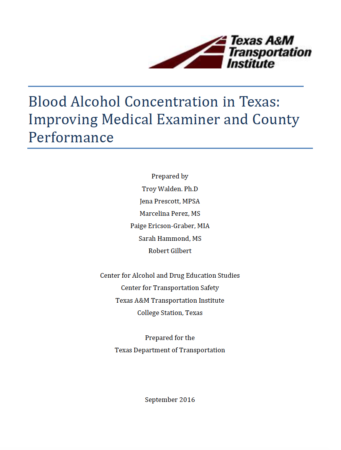 As part of a Texas Department of Transportation project, the Texas A&M Transportation Institute conducted surveys of Justice of the Peace Offices and Medical Examiners to determine the process each system undertakes when ordering and reporting BAC toxicology results. TTI also conducted a series of webinars to facilitate discussions about the current BAC toxicology reporting process in order to identify areas for improvement.
As part of a Texas Department of Transportation project, the Texas A&M Transportation Institute conducted surveys of Justice of the Peace Offices and Medical Examiners to determine the process each system undertakes when ordering and reporting BAC toxicology results. TTI also conducted a series of webinars to facilitate discussions about the current BAC toxicology reporting process in order to identify areas for improvement.
Medical Examiners and Justices of the Peace are required by statute to report certain data, namely blood alcohol concentration (BAC) toxicology results to TxDOT’s Crash Records Section. However, occasionally BAC toxicology reporting is not performed as required. Failing to report BAC toxicology results can adversely impact the amount of federal funding that is available to the State of Texas for alcohol and drug traffic safety programs. The missing data also lessens the ability of stakeholders to provide an accurate accounting of the high number of alcohol and/or drug related fatal crashes that are experienced in Texas annually.
The purpose of the report, Blood Alcohol Concentration in Texas: Improving Medical Examiner and County Performance, is to detail the extent to which alcohol and/or drugs play a role in fatal crashes in Texas. By examining the crash reports from the Crash Records Information System (CRIS) and evaluating them to determine the level that BAC toxicology reporting is completed by counties and medical examiners offices, this report acts as a formative tool for TxDOT. The report also examines the BAC toxicology reporting practices that are being carried out by Medical Examiners and Justices of the Peace in this state.
Read the full report.


